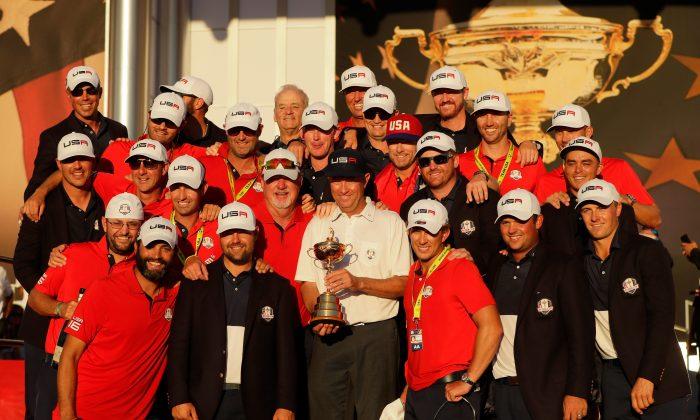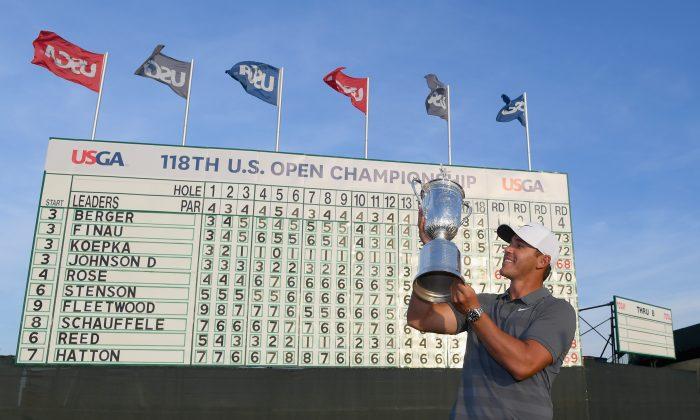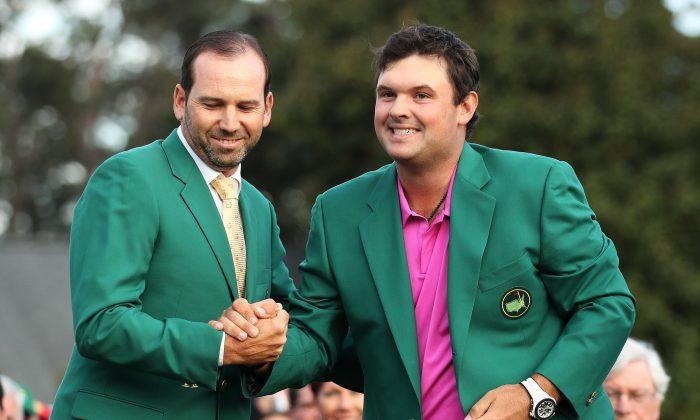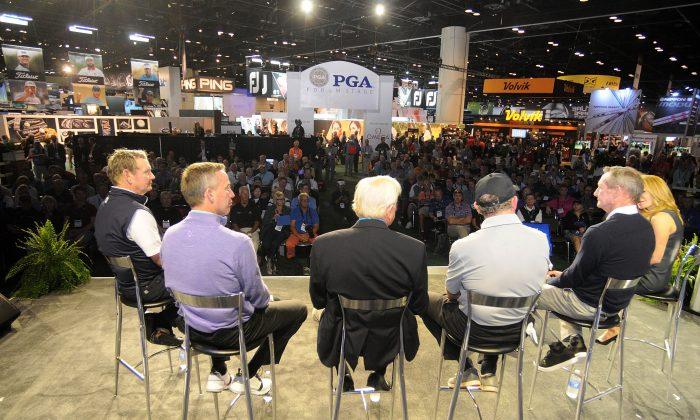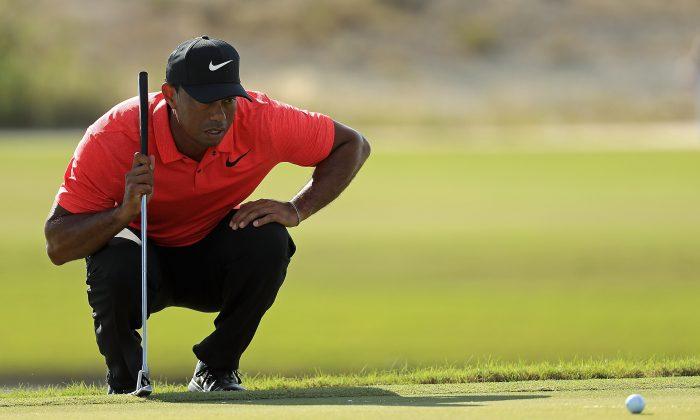CHASKA, MN—The wait is now over.
The American squad used a total team effort in recapturing the Ryder Cup with a resounding 17–11 victory over Team Europe. The victory ended a three-win streak for Europe and was sweet retribution for an American squad which squandered a four-point final day lead four years ago at Medinah with a team Captained by Davis Love III -- the same man who held the helm position for this year’s team for the contest hosted at Hazeltine National Golf Club in the Minneapolis suburbs.
At 4:10 PM local time American Ryder Cup rookie and final Captain’s pick Ryan Moore provided the clinching victory point with an 18th hole conceded par that finally ended the anguish the American squad has endured for 8 of the last 10 times when losing to Team Europe in the bi-annual contest.
“We learned a lot from the last 4-5 Ryder Cup Matches,” said a relieved and cheerful USA Captain Davis Love III.
The American squad entered the final day of 12 Singles matches with a three point cushion. Only twice since 1979 in Ryder Cup history -- in 1999 at The Country Club when the USA rebounded in spectacular fashion overcoming a four-point deficit, and at Medinah when Team Europe fashioned an equally remarkable comeback -- has a team overcome such a margin.
Knowing such a monumental final day comeback could only happen with a positioning of his star players at the top of the line-up, European Captain Darren Clarke opened with his best team player Rory McIlroy followed by Open Champion Henrik Stenson, rookie sensation Thomas Pieters and Olympic golf champion Justin Rose. Clarke believed a quick start by this quartet could provide valuable momentum and snare another improbable comeback.

Early on the strategy seemed to be working as the four were all in solid position to provide a clean quartet sweep.
However, unlike the Medinah meltdown which Love readily took full responsibility for in badly handling his final day line-up there, Davis went with his best player to match the likes of McIlroy.
His name -- Patrick Reed.
The 26-year-old, making his second Ryder Cup participation, provided both top tier play and emotional charge for the American side. Reed had teamed with Jordan Spieth in the earlier team portion earning 2 1/2 points prior to his pivotal match with the talented Northern Irishman who coming into Hazeltine had never lost a Singles match in three previous Ryder Cup outings.
The pairing was the most anticipated one-on-one match in recent times in Ryder Cup play as both had provided outstanding play and emotional inspiration for their respective teammates.
Reed and McIlroy provided nothing less than mindboggling play for the first eight holes. Both men were five-under-par during that run of holes and capped when after McIlroy sunk a 60-foot plus birdie putt at the par-3 8th he turned to the crowd and mouthed, “I can’t hear you,” in order to silence what had been a series of deafening roars stoked by Reed’s ability to sink critical putts time after time. Just as McIlroy exited the stage with his birdie made -- Reed sunk his 25-foot birdie putt to match the Ulsterman. The ground at Hazeltine was shaking was this utterly incredible back and forth scintillating play.
The initial match was the one both sides believed could set the tone for what would follow. As incredible as the play was from Reed and McIlroy on the outward half of holes -- the back nine play was marked by inconsistent shotmaking. Reed was able to secure his first lead at the 12th with another uncanny par putt to fall. McIlroy hung gamely but at the par-5 16th, McIlroy failed to hit the fairway and was forced to lay-up. Reed went for the par-5 hole in two shots -- missed right into the adjoining greenside bunker but was able to hit his next shot close enough to the hole for a conceded birdie. McIlroy failed to birdie -- giving Reed a two hole lead with just two to play.

After losing the par-3 17th and with the margin reduced to one hole -- the 18th would prove essential to both competitors. After each found the fairway Reed played a splendid approach to 9 feet. McIlroy’s approach finished slightly inside Reed and the suspense of the match reached its apex. Reed finished off McIlroy with a winning birdie to cap a tremendous match win for Team America.
Stenson and Pieters easily defeated the likes of Jordan Spieth and J.B Holmes on the USA side to rekindle some hope that Team Europe could make inroads into the American lead. The crucial match was the one that followed -- pitting Rose against Rickie Fowler. Coming into the matches, Fowler had been a Captain’s pick and in two previous Cup appearances had not won any points.
Fowler entered the singles match with a win and a loss in the team portion. Winning a point against Rose appeared to be a heavy chore to achieve. Early on Rose showed fire -- birdieing the first two holes. Fowler responded at the 2nd to match the Englishman and from that point on the match never had any lead greater than 1-up.
Rose was unable to make crucial putts on the inward side and when Fowler birdied the par-5 16th he seized his first lead. Pars at the final two holes were good enough for Rickie to earn his first singles win.
The triumph proved to be a clear break in any potential European momentum to gain traction. The split of the first four matches simply pushed the outcome to the later matches where the quality of the American depth proved to be insurmountable. In the final six matches the USA would have outrights wins by the likes of Moore, Brant Snedeker, Dustin Johnson, Brook Koepka and Zach Johnson.
Patrick Reed led the way for the United States with 3.5 points, while Koepka and Snedeker each scored three. For Europe, three players failed to record a point: Matthew Fitzpatrick, Andy Sullivan and Masters champion Danny Willett.
All 12 members of Captain Davis Love III’s U.S. Ryder Cup team had a hand in winning at least one match this week at Hazeltine, and, in fact, this feat was completed by the end of Saturday afternoon’s session. The last time every member of a U.S. Ryder Cup Team earned at least one win in a single Ryder Cup was in 1975 at Laurel Valley, when Arnold Palmer’s squad bested Europe, 21 to 11.
Since the last loss at Gleneagles in Scotland in 2014, the American side had decided to revamp its overall approach. A task force was assembled to re-examine the method by which the USA team went about its business. Love’s Captaincy was one of total consensus building and getting all of the selected players to thoroughly understand their role in what would be needed to finally earn back the Ryder Cup after an eight year absence.
Although the European squad was beaten there were clear signs that in two years time, when the matches will resume again in Paris for the first time, the line-up will be well prepared to go forward. At Hazeltine -- Europe entered the contest with six rookies in the line-up. The best of the lot came from two players who showed much promise that Europe is able to turn the page and add to its firepower.
Thomas Pieters, the 24-year-old Belgium, set a European Ryder Cup record with four points earned in his debut. His play -- most notably with McIlroy in the team portion showed a prowess far beyond what anyone could have possible expected -- save for Europe Captain Clarke who smartly added him as a Captain’s choice.

His four wins surpass the previous record of three set by several European greats, including Sir Nick Faldo, José María Olazábal and Sergio Garcia. Additionally, the four points scored by Pieters puts him past the 3½ tally set by Paul Way (1983), Sergio Garcia (1999) and Paul Lawrie (1999).
In addition to Pieters, the play of fellow rookie Rafa Cabrera Bello from Spain, was also superb. The Spaniard finished the contest with a mark of 2–0–1 and showed top tier form in dispatching PGA Champion Jimmy Walker by a 3&2 margin.
Davis Love III’s four Captain’s Selections -- Rickie Fowler (2–1–0), J.B. Holmes (1–2–0), Matt Kuchar (2–2–0) and Ryan Moore (2–1–0) -- combined on a 7–6–0 record this week at Hazeltine. The quartet’s 7 combined victories set a new mark for combined wins from Captain’s selections in a single Ryder Cup. The former mark of 6 was shared by the 2010 and 2012 United States Teams -- the U.S. made just two Captain’s picks from 1989-2006, before evolving to its present allotment of four in 2008.
Equally entertaining was the joust between Ryder Cup veterans Phil Mickelson and Spaniard Sergio Garcia. Between the two players -- a total of 19 birdies were made -- 10 by Phil and 9 by Sergio. It was truly fitting the match would end in a tie as both men birdied the final hole in glorious fashion. With his 45th match today, Phil Mickelson trails only Sir Nick Faldo’s 46 matches for most all-time, while his 11th Singles match ties Arnold Palmer for most by a United States player. After a 2–1–1 record this week, Mickelson is up to 18 wins all-time, trailing Palmer (22), Billy Casper (20) and Lenny Wadkins (20).
On Saturday, Phil Mickelson eclipsed the tie held for the record of Most Four-Ball Matches won that was shared win Wadkins and Palmer. Mickelson now has 8 wins at Four-Ball. Wadkins and Palmer are tied for second with 7.
The six rookies for Europe finished with a 2–4–0 record in singles play, while the United States team’s two rookies Brooks Koepka and Ryan Moore each won their matches.
Prior to Sunday’s Singles session and dating back to 1999, European rookies were a combined 8–17–6 in the Singles format. During the same stretch, U.S. rookies were 14–14–3. The last rookies to win a Singles match occurred for both sides in 2014, when Jamie Donaldson (Europe), Patrick Reed (U.S.) and Jimmy Walker (U.S.) accomplished the feat for their respective sides.
RYDER CUP NOTES --
*Since 1979, the team who wins the Singles session has won the Ryder Cup 15 of the 19 times -- including this year.
*Rafa Cabrera Bello (2–0–1) was the lone European without a loss during the 41st Ryder Cup; while Brandt Snedeker remained unbeaten as well, turning in a perfect 3–0–0 mark.

*European players entered Sunday’s Singles matches with a combined 13–13–2 record, while the United States players were collectively 13–11–2. Dating to 2008, European players who participate in five sessions were 4–0–1 in Singles entering Sunday.
*There is no “most valuable player” in Ryder Cup play but clearly Patrick Reed showed his boast from a few years ago after winning the WGC-Doral event that he was among the top five players in the world cannot be dismissed out-of-hand. As Love noted it is Reed who is ideally suited for the intensity and swings of emotion that Ryder Cup play features.
*If Reed was the MVP for Team USA -- the future for Brooks Koepka on upcoming American teams looks equally promising. Koepka served notice immediately he was ready to play when bombing his opening tee shot 340 yards down the first fairway during Friday’s Four-ball contest. In his Singles match against Masters champion Willett -- Koepka had no bogeys and five birdies in a virtuoso performance.
*Clarke will be questioned in his decision to add Englishman Lee Westwood as a Captain’s pick when the likes of Scotsman Russell Knox had demonstrated a superior season. The 43-year-old playing in his 10th Ryder Cup was unable to secure a much needed point in his Saturday four-balls contest with several crucial putting misses -- the capper coming at the 18th -- missing a very makeable two-foot putt for birdie and providing the USA with a gift victory. Westwood had a two-up lead on Moore with three holes to play but Moore finished with an eagle on the par-5 16th and a solid birdie on the par-3 17th and then won the individual match and overall Cup with a conceded par-putt on the 18th.
*All players wore the umbrella signature brand pin on their jackets honoring the late Arnold Palmer who passed away the Sunday leading into the Ryder Cup Matches. Palmer’s 1975 Ryder Cup bag was placed on the 1st tee saluting his role in the bi-annual contests and his outstanding contributions to golf. A memorial service for Palmer will be held this Tuesday in his hometown of Latrobe, PA.
Captain’s Picks Tally
Europe: 5–7–0
Martin Kaymer 1–3–0
Thomas Pieters 4–1–0
Lee Westwood 0–3–0
United States: 7–6–0
Rickie Fowler: 2–1–0
J.B. Holmes: 1–2–0
Matt Kuchar: 2–2–0
Ryan Moore: 2–1–0
Rookie Report
Europe: 7–9–1
Rafa Cabrera Bello: 2–0–1
Matthew Fitzpatrick: 0–2–0
Thomas Pieters: 4–1–0
Andy Sullivan: 0–2–0
Danny Willett: 0–3–0
Chris Wood: 1–1–0
United States: 5–2–0
Brooks Koepka: 3–1–0
Ryan Moore: 2–1–0
The 42nd Ryder Cup Matches take place in 2018 at Le Golf National in Versailles, Paris, France where Team Europe will be determined to make sure the American squad is unable to secure its first win on foreign soil since its 1993 win at The Belfry in England.
M. James Ward, a member of Golf Writer’s Association of America (GWAA) and past member of Met Golf Writer’s Association (MGWA), has reported on golf’s grandest events since 1980 in a variety of forums.
